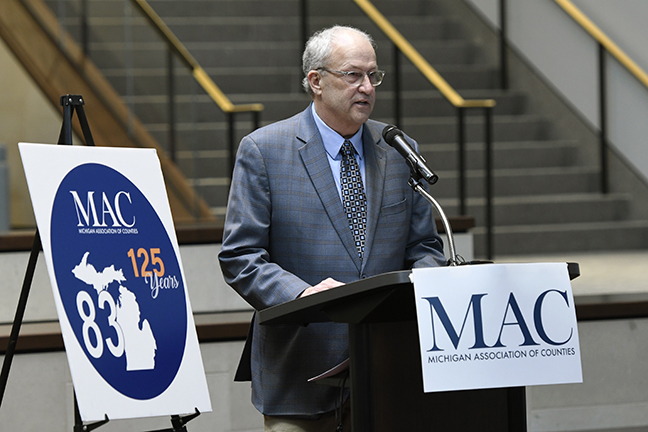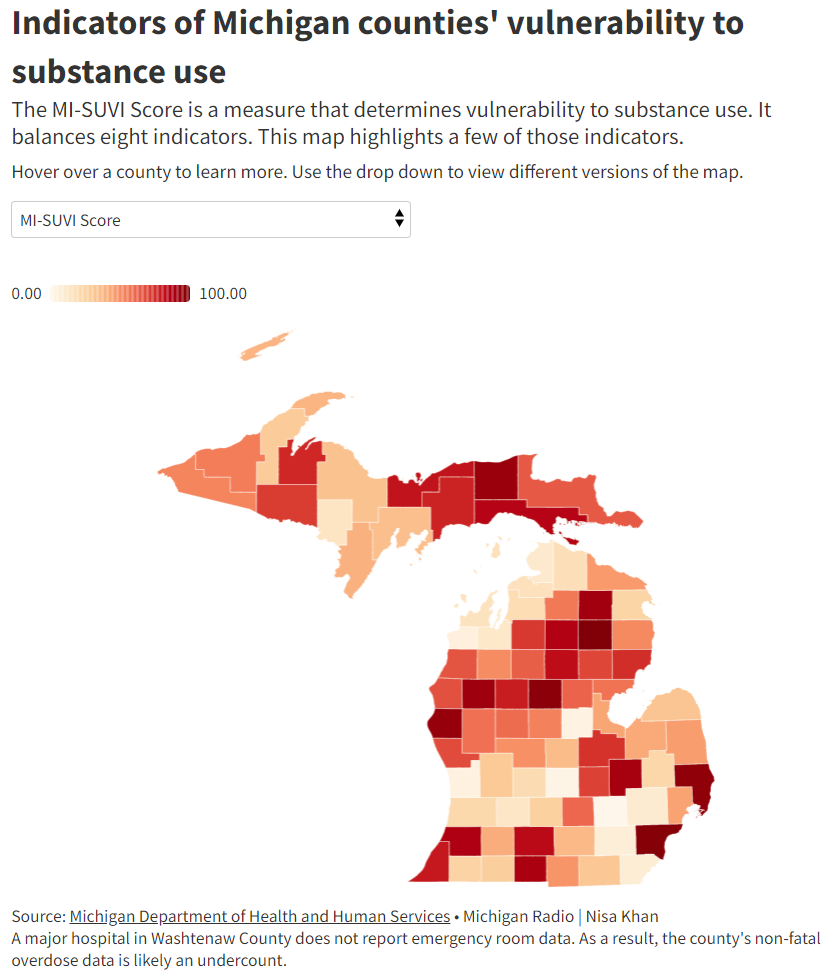MAC launches 125th Anniversary year with Capitol kickoff event

Board President Stan Ponstein of Kent County welcomes attendees to the State Capitol for MAC’s 125th Anniversary launch event on Feb. 1.
The Michigan Association of Counties launched its 125th Anniversary on Feb. 1 with a State Capitol announcement and reception featuring remarks from state and county leaders.
“On this date, 125 years ago, in the Senate chamber just steps away, representatives from 16 counties gathered to form this association,” said Stan Ponstein of Kent County, president of the Michigan Association of Counties’ Board of Directors. Ponstein noted that while Kent was not among the original 16, it has produced the largest number of MAC presidents – 11 and counting.
Originally formed as the State Association of Supervisors of Michigan, the association was formally renamed the Michigan Association of Counties in 1969 as the state shifted to county boards staffed by commissioners directly elected from geographic districts.
“In addition to those who have helped lead this organization to where it is today are those whose current commitment helps us achieve our long-standing role to educate and advocate for all 83 counties,” said Executive Director Stephan Currie in his remarks. “We have an incredibly diverse and qualified staff who work tirelessly on behalf of every county in the state. … Our team is honored to be supported by the MAC Board of Directors who are elected by their fellow commissioners to represent the broad needs of our state’s 83 counties. These board members are the engine of our association.”
Also speaking at the event in the State Capitol’s new Heritage Hall were:
- State Sen. Veronica Klinefelt of Macomb County
- State Rep. Julie Rogers of Kalamazoo County
- State Rep. Ken Borton of Otsego County
- State Rep. Matthew Bierlein of Tuscola County
Klinefelt, Borton and Bierlein, all former MAC Board presidents, presented a personal legislative tribute to MAC to mark the anniversary.
See a photo gallery from the event.
MAC also unveiled a special logo for the anniversary year, which will include a variety of events culminating in an Anniversary Gala for members at the association’s 2023 Annual Conference in Kalamazoo County in October.
To keep track of all the anniversary activities and resources, bookmark the 125th Anniversary Page on the MAC website at www.micounties.org.
MAC is the oldest Michigan association representing local governments and the only one dedicated to the representation of all county commissioners in Michigan.
MAC partners on toolkit to help counties address opioids challenge
 A new toolkit designed by MAC and Vital Strategies, a health policy nonprofit, was released this week to help counties address an overdose crisis that claimed the lives of more than 3,000 people in 2021.
A new toolkit designed by MAC and Vital Strategies, a health policy nonprofit, was released this week to help counties address an overdose crisis that claimed the lives of more than 3,000 people in 2021.
The state of Michigan is slated to receive nearly $800 million over 18 years as part of the opioid litigation settlements, and approximately half of these funds will go directly to county and municipal governments, providing an opportunity to strengthen evidence-based, accessible resources in local communities.
To support local governments, MAC and Vital Strategies have produced a Michigan Opioid Settlement Funds Toolkit: A Guide for Local Spending. This new toolkit provides local governments, community organizations and health care providers with guidance on how to utilize opioid settlement funds. The executive summary can be accessed here. MAC is available to assist local leaders through this process by providing technical assistance.
“MAC and Vital Strategies’ partnership has resulted in this excellent toolkit and staff who can provide real-time support to members on their opioid abatement strategies. We’re proud that MAC can support its members – and Michigan – in combatting the growing and complex overdose crisis.” said Stephan Currie, executive director of the Michigan Association of Counties.
The toolkit contains several components, including:
- Settlements overview, which provides information on the opioid litigation settlements, the state and local agreement, estimated funds per county, future funds and the tribal government settlements.
- Statistical overview and local data describing the scope of the overdose crisis, providing state-level data and where to access local data.
- Overview of spending principles laid out by Johns Hopkins School of Public Health and FXB Center for Health and Human Rights, as well as indicators for spending readiness.
- Steps for spending, which includes a framework for jurisdictions to begin their process of allocating opioid settlement funds, and general steps to follow during this process.
- Strategies for spending, which outlines key strategies from the State of Michigan, Exhibit E of the current settlement agreement and Johns Hopkins School of Public Health.
- Resources and practical tools around research and evidence-based programming to aid in local planning and spending are linked throughout the document.
Local governments will find guidance in the toolkit for stakeholder engagement, monitoring and accountability for the life-course of the spending process, information-gathering to assess and understand the needs of the community, and determining the process for moving forward. The new toolkit also provides strategies for engaging people who have lived experience, a critical component for success that is often overlooked.
For more information on opioid assistance through MAC, contact Amy Dolinky at dolinky@micounties.org.
State releases index on counties ‘vulnerable’ on substance use disorders
 Oscoda, Wayne, Clare, Schoolcraft and Oceana counties are among those deemed most “vulnerable” on substance use according to a new data analysis by the Michigan Department of Health and Human Services.
Oscoda, Wayne, Clare, Schoolcraft and Oceana counties are among those deemed most “vulnerable” on substance use according to a new data analysis by the Michigan Department of Health and Human Services.
As reported by Michigan Radio earlier this week, several key points were extracted from newly released statewide opioid epidemic data to determine what communities and demographics are most vulnerable and in need of greater assistance. This Michigan Substance Use Vulnerability Index (MI-SUVI) has been designed to use more specific factors beyond just overdose rates to determine need.
The MI-SUVI Score is a measure that determines vulnerability to substance use, balancing eight indicators. Those eight indicators are divided into three categories: substance use burden, substance use resources, and social vulnerability. Each of these categories are separately defined. Substance use burden “looks at numbers like overdose rate, opioid prescribing rate, and more.” Substance use resources, for example, considers how many people in a county are within a 30-minute drive to a treatment center. Social Vulnerability, as defined by the Centers for Disease Control and Prevention (CDC), “looks at social determinants to health, like technology and health care access.”
Newly reported data also revealed that young women ages 11-24 saw the highest overdose emergency department visits in 2020 and 2021, and that Black Michiganders are facing the highest rates of overdose deaths in the state.
While 2022 data is not yet complete, it currently suggests that overdose deaths in Michigan are slightly lower than previous years. Recent data also suggests that the number of Syringe Service Programs have tripled since 2019. Syringe Service Programs “allow individuals to safely get access to or get rid of injection equipment.” The Michigan Department of Health and Human Services provides a list of locations of Syringe Service Programs and Narcan Vending Machines.
As a result of all of nationwide opioid settlements, Michigan could receive $1.45 billion. The first portion of these payments, a total of $81 million, was distributed to local units of government on Jan. 31.
The Michigan Association of Counties (MAC) Opioid Settlement Resource Center website is a centralized hub for those engaged in planning and utilization of opioid settlement funds. The resource center houses a settlement tracking link, county-specific payment estimates, the Michigan Opioid Settlement Toolkit: A Guide for Local Spending, a resource library and a support request form. The Opioid Settlement Resource Library highlights resources to explore principles and tracking, evidence-based and promising practices, local government tools, legal resources, equity resources, other toolkits and reports and additional opportunities for funding. Support and technical assistance are available through completion of the Opioid Settlement Assistance Request Form.
For more information on MAC’s advocacy work on public health issues, contact Samantha Gibson at gibson@micounties.org.
New law sets Feb. 27 for presidential primary but questions remain
 Voters would participate in Michigan’s presidential primary election on Feb. 27, 2024, under legislation signed into law this week. Or they may not, depending on how legal wrangling over legislative session rules play out.
Voters would participate in Michigan’s presidential primary election on Feb. 27, 2024, under legislation signed into law this week. Or they may not, depending on how legal wrangling over legislative session rules play out.
The primary legislation was spurred by the Democratic National Committee’s reorganization of the party’s primary calendar and would make Michigan the fifth state in the nation to vote, behind South Carolina, New Hampshire, Nevada and Georgia.
Senate Bill 13, by Sen. Jeremy Moss (D-Oakland), had overwhelming Democratic support, as party members have long advocated for an earlier position in the primary timeline to gain more power in selecting presidential nominees.
Republicans have the opposite view. The Republican National Committee is unwilling to change its rules to move up the GOP presidential primary date, and it plans to cut 85 percent of Michigan’s delegates for the GOP convention if the primary is held Feb. 27, 2024.
Since SB 13 passed the House 56-53, it did not gain immediate effect, which means the earliest it could take effect is 90 days after the last day of the legislative year. Considering session typically adjourns in mid-December, this presents a problem for the Feb. 27 date. The Legislature would need to adjourn no later than November to allow for the law to operate as planned. The next steps remain unclear as the parties continue to negotiate.
County and municipal clerks have expressed their inability to conduct two separate elections so close together; the result would be a financial and logistical nightmare. It is possible the Michigan Republican Party could select a presidential candidate through a caucus or convention, making a GOP primary unnecessary.
MAC did not take a position on the legislation but will monitor the situation and provide updates as needed.
For more information on this issue, contact Madeline Fata at fata@micounties.org.
Despins joins MAC staff as governmental affairs assistant
 MAC filled out its Governmental Affairs Team this week as Amanda Despins joined the staff as governmental affairs assistant.
MAC filled out its Governmental Affairs Team this week as Amanda Despins joined the staff as governmental affairs assistant.
Prior to joining MAC, Despins served as a constituent relations liaison and legislative director in the Michigan House of Representatives for Rep. Ken Borton, a former MAC Board president. She holds a B.A. in international studies from the University of Michigan.
“Amanda comes to MAC highly recommended for her thoroughness and organizational skills,” said Deena Bosworth, MAC director of governmental affairs. “The Governmental Affairs Team is excited to have her on board to help facilitate all the work we do with our commissioners and with legislators.”
The governmental affairs assistant focuses on staff support for MAC’s internal policy committees and scheduling for Bosworth and the governmental affairs associates.
“MAC has a long history of being a respected organization in Lansing and advocating for counties on key issues,” Despins said. “I’m excited to work for such a reputable organization and join the MAC Team!”
Despins can be reached at despins@micounties.org.
 Staff picks
Staff picks
- DNR to use ARPA funds for improvements at state parks and campgrounds (MidMichiganNow.com)
- New report addresses biggest obstacles to effectively tackling blight (Citizens Research Council of Michigan)
- Road salt, a stealthy pollutant, is damaging Michigan’s waters (Michigan Radio)
- Michigan assembling 1,000-acre ‘mega sites’ to attract big investments (MLive)
